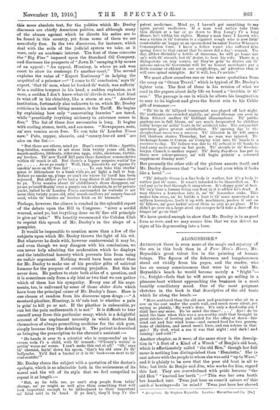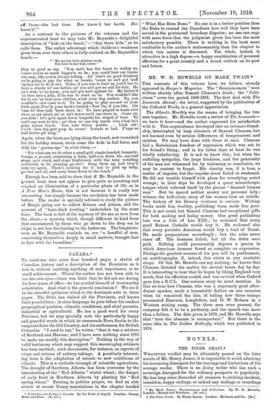ALONGSHORE.*
ALTHOUGH there. is even more of the magic and mystery of the sea in this book than in A Poor Man's House, Mr.
Reynolds's great talent lies in the painting of human beings. The figures of the fishermen and longshoremen stand out vividly from his pages, and the reader, who
has an uneasy consciousness that were he to visit Mr. Reynolds's beach he would become merely a " fright "- i.e., freight—feels that he will never again go sailing in a pleasure-boat without approaching the boatman in a most humbly conciliatory mood. One of the most poignant sketches in the book is that descriptive of the old boats which lie along the beach :— " More scattered than the old men and pensioners who sit in a row on the seat under the south wall, and much more silent, yet saying as My work's done. It's only a dead-calm sea I shall face any more. Do 'oe mind the time?. . . .' Aye ! do 'ee mind the time when this was a sea-worthy craft that brought in great catches of herring and sailed for the offing at dawn—fair wind out and fair wind home—and earned food for two genera- tions of children, and saved men's lives, and ran ashore in that gale ? My God, what a sea it was that night ! and dark ! and raining ! and cold !"
Another chapter, as it were, of the same story is the descrip- tion in "A Sort of a Kind of a Wreck" of Benjie's old boat, which is affectionately called "the old Hen," though her full name is nothing less distinguished than Henrietta.' She is cast ashore with the people to whom she was sold "up to Ware," and it is plainly to be seen that the poor old boat is all to bits; but little do Benjie and Jim, who works for him, regard this fact. They are overwhelmed with pride because "the old Hen" " knowed her berth ":—" This was her own berth her knocked into. 'Twas just here us come'd ashore wi' thic catch o' herrings—do 'ee mind? 'Twas just here her shoved
• Alongshore. By Stephen Reynoldi. London: Macmillan and Co. E53./
off from—the last time. Her . know'd her berth. Her know'd !"
As a contrast to the pictures of the veterans and the superannuated boat we may take Mr. Reynolds's delightful description of "kids on the beach,"—" they there kids," as he calls them. The unfair advantage which children's weakness gives them over their elders is fully realised on Mr. Reynolds's beach :—
" ' We are but little children weak, Not born to any high estate
they as good as say. You can't lute the heart to wallop us, 'muse you'm so much bigger'n us be ; you could beat our brains out easy, like you'm always telling. An' tisn't no good thinking we'm going to pay for what us breaks, 'cause us an't got 'nuff 'ap'nys for to do it wiv. 'Sides, if you was to hurt us, you'd hae to have a shindy wi' our father, an' you an't got no call for that. He an't done 'ee no harm ; you an't got nort against he. My father'd 'at thee into a jelly, if he was to start on 'ee. You wouldn't like for to see 'en beat your chil'ern, n'eet your dog nuther. No, you wouldn't—not come to it. Us be going to play see-saw wi' your little punt d'rec'ly your back's turned—'fore 'tis, if you like. Git 'ome wi' thee talk 'bout stove in ! Us have played in boats ever since us can mind, an' us an't never seed one stove in. Come on, you kids ! let's go'n squat down 'longside his stupid a boat. 'Er can't say nort to.thic ; an' than us can slip inside o'en when he's gone across beach. You take thiccy paddle. . . . Look out ! Coo'h ! how the gert poop do swear ! Sounds so bad. P'raps us had better git 'long.
Again, when the boats are lying along the beach, new varnished for the holiday season, down come the kids in full force, and defy the " grown-ups " to evict them :— " For what can we do when a small girl, single-handed, bumpety- humps a go-cart, containing a baby, half-way down the sea-wall steps, gets stuck, and stops frightened, with the baby wobbling perilously in its swaying go-cart? Drag them up, and they'll only try again. There's nothing for it but to pick up baby, go-cart and all, and carry them down to the beach."
Enough has been said to show that if Mr. Reynolds in the
pesent book does not appear to give quite so arresting and original an illumination of a particular phase of life as in
A Pcor Man's House, this is not because it is really less interesting, but simply because the revelation has been made before. The reader is specially advised to study the picture
of Benjie going out to collect flotsam and jetsam, and the account of "lame-duck hunting" undertaken by the same hero. The book is full of the mystery of the sea as seen from
the shore,—a mystery which, though different in kind from that encountered by those who go down to the deep sea in
ships, is not less fascinating to the looker-on. The longshore- men, as Mr. Reynolds reminds us, are." a handful of men,
concerning themselves deeply in small matters, brought face to face with the boundless."



































































 Previous page
Previous page